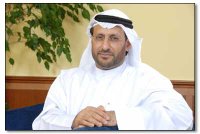
Dubai International Academic City (DIAC), the region's centre for international higher education and a member of TECOM Investments, today unveiled its criteria for accepting international universities into its growing knowledge community. The stringent criteria applies to all educational institutions seeking to become a part of DIAC.
DIAC’s newly formed academic committee is responsible for reviewing applications and assessing each submission based on various factors including an academic plan’s ability to strategically add value to DIAC’s overall programme offering, while meeting the demand of students and industry sectors across the region for specialised courses of study.
The academic and research standing of the university, quality of the faculty and administrative staff of the campus that will be based at the DIAC complex, as well as the financial status of the institution will also come under the committee’s scrutiny.
Dr Ayoub Kazim, Executive Director, Dubai International Academic City and Dubai Knowledge Village, said: “Dubai International Academic City aims to contribute to Dubai’s transition towards a knowledge-based economy, in line with the objectives of Dubai Strategy Plan 2015. By finalizing our criteria for screening potential higher education institutions, we look forward to attracting top-tier global universities with the capability to respond to the requirements of our local and regional markets.”
In 2007, only 9.2 per cent of applications were accepted, reflecting the strict criteria that DIAC already adheres to in vetting institutions before admitting them. A total of 54 applications were received, of which only five fulfilled all of DIAC’s criteria.
Last year’s successful applicants included the Hult International Business School, ranked 39th in the world and 21st in the US by the Economist Intelligence Unit. Hult is also the first US business school to establish a full-time fully accredited MBA programme in the Middle East.
Murdoch University International Study Centre Dubai, a core branch of Murdoch University, ranked by the annual Graduate Careers Council of Australia survey as one of the top five journalism schools in the country, is another institution that was approved to offer a range of media and communications programmes from DIAC.
Michigan State University-Dubai, a non-profit higher education institution, offers degree programmes equivalent to the curriculum provided by Michigan State University in East Lansing, Michigan. Ranked as the eighth largest university in the US and classified by Times Higher Education as one of the top 200 universities in the world, MSU has designed various undergraduate and postgraduate programmes for benefiting the students of Dubai and the region at large.
University of Phoenix, one of the oldest and largest online higher education providers in the US that offers more than 80 online programmes, in addition to the Postgraduate Management Institute from Sri Lanka, make up the five new entrants for 2007.
In 2006, a 13.9 per cent acceptance rate was registered with five partners being named out of 36 applications. Among them were the Manchester Business School Worldwide, one of the world's Top 100 and the largest in the UK; Institute of Management Technology, one of India’s highly ranked management schools; University of Exeter, which is currently nominated as the university of the year in the UK, offering post graduate studies in education from its Dubai campus; SAE Institute from Australia renowned for its media programmes; and Esmod, a French fashion institute providing a range of creative, technical and marketing streams for students who wish to be part of the region’s fast growing fashion industry.
“Dubai International Academic City continues to work towards ensuring that its partner institutions have the wherewithal to provide the necessary infrastructure and offer programmes that set an appropriate learning environment in the Arab region,” concluded Kazim.
At present, the TECOM Investments’ knowledge clusters host more than 25 reputed international universities of higher learning from diverse regions including the US, the UK, Belgium, Iran, Russia, Australia, Sri Lanka, France, Pakistan and India, catering to over 10,000 students.


0 Comments:
Post a Comment
Links to this post:
Create a Link
« first page